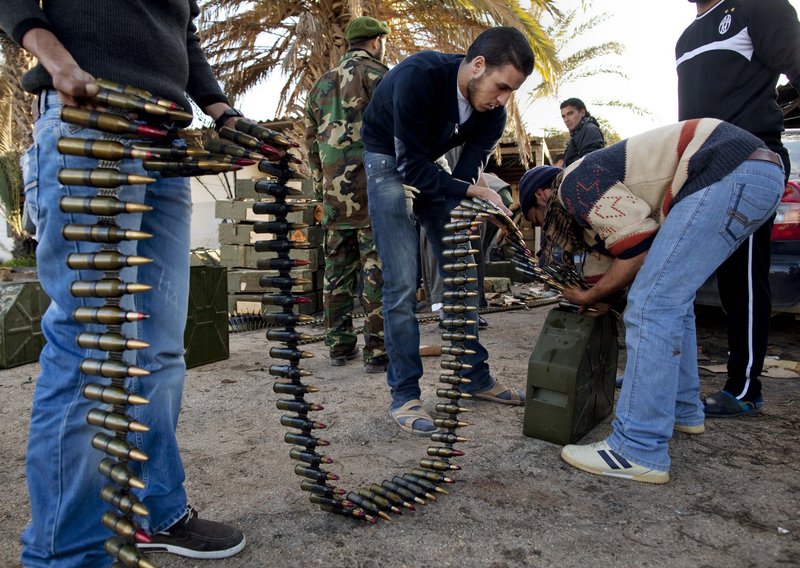TRIPOLI, Libya — International pressure on Moammar Gadhafi to end a crackdown on opponents escalated Monday as his loyalists fought rebels holding the two cities closest to the capital and his warplanes bombed an ammunition depot in the east.
The United States moved naval and air forces closer to Libya and said all options were open, including patrols of the North African nation’s skies to protect its citizens from their ruler.
France said it would fly aid to the opposition-controlled eastern half of the country. The European Union imposed an arms embargo and other sanctions, following the lead of the United States and the United Nations. The EU was also considering the creation of a no-fly zone over Libya. And the United States and Europe were freezing billions in Libya’s foreign assets.
“Gadhafi has lost the legitimacy to govern, and it is time for him to go without further violence or delay,” Secretary of State Hillary Rodham Clinton said. “No option is off the table. That of course includes a no-fly zone.”
British Prime Minister David Cameron told lawmakers: “We do not in any way rule out the use of military assets” to deal with Gadhafi’s regime.
Gadhafi, who in the past two weeks has launched the most brutal crackdown of any Arab regime facing a wave of popular uprisings, laughed off a question from ABC News about whether he would step down as the Obama administration demands.
“My people love me. They would die for me,” he said. ABC reported that Gadhafi invited the United Nations or any other organization to Libya on a fact-finding mission.
Gadhafi’s remarks were met with derision in Washington. “It sounds, just frankly, delusional,” said U.S. Ambassador to the U.N. Susan Rice. She added that Gadhafi’s behavior, including laughing on camera in TV interviews amid the chaos, “underscores how unfit he is to lead and how disconnected he is from reality.”
The turmoil in the oil-rich nation roiled markets for another day. Libya’s oil chief said production had been cut by around 50 percent, denting supplies that go primarily to Europe. The country provides 2 percent of the world’s oil, but concerns the unrest will spread to other oil-rich nations have sent oil prices rising worldwide.
The uprising that began Feb. 15 has posed the most serious challenge to Gadhafi in his more than four decades in power. His bloody crackdown has left hundreds, and perhaps thousands, dead. But clashes appear to have eased considerably in the past few days after planeloads of foreign journalists arrived in the capital at the government’s invitation.
The two sides are entrenched, and the direction the uprising takes next could depend on which can hold out longest. Gadhafi is dug in in Tripoli and nearby cities, backed by his elite security forces and militiamen who are generally better armed than the military. His opponents, holding the east and much of the country’s oil infrastructure, also control pockets in western Libya near Tripoli.
Send questions/comments to the editors.



Success. Please wait for the page to reload. If the page does not reload within 5 seconds, please refresh the page.
Enter your email and password to access comments.
Hi, to comment on stories you must . This profile is in addition to your subscription and website login.
Already have a commenting profile? .
Invalid username/password.
Please check your email to confirm and complete your registration.
Only subscribers are eligible to post comments. Please subscribe or login first for digital access. Here’s why.
Use the form below to reset your password. When you've submitted your account email, we will send an email with a reset code.